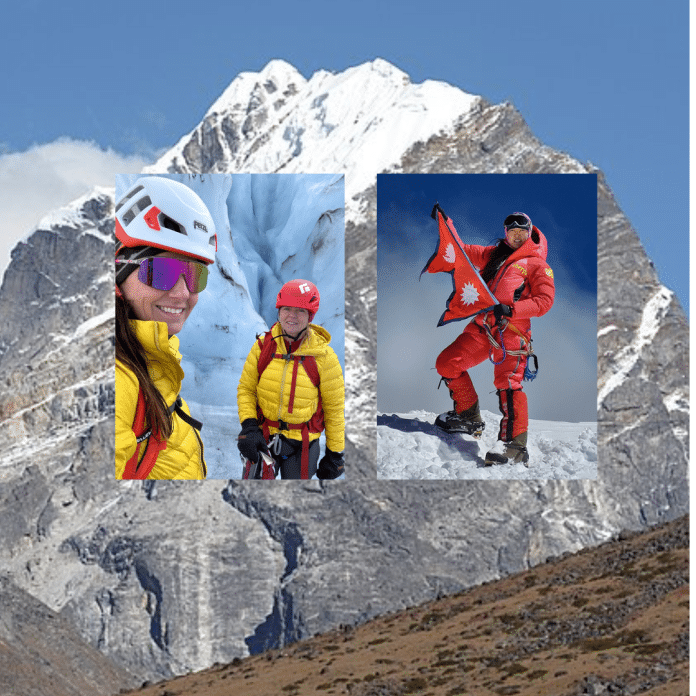When Soffía Sigurgeirsdóttir, the manager of an all-women public relations company in Iceland, was a little girl, she dreamt of the peaks of the Himalayas. Later, as a board member and Secretary-General of the UN Women Committee in Iceland, she learnt about the difficult conditions of women in Nepal.
These two interests have come together as Sigurgeirsdóttir heads to Nepal with a fellow Icelander, Lukka Pálsdóttir. They have joined forces with Nepalese women mountaineers in a project called “Climb for Change.” It is an all-female expedition to Lobuche Peak (6,119m) in the Himalayas. The aim is to empower Sherpa women to lead expeditions, gain financial independence, and step into leadership roles in mountaineering, where gender barriers have long persisted.

5.) Pasang Lhamu Sherpa Akita is a national hero in Nepal. Photo: Climb for Change
Not a men´s club
Mountaineering has historically had the reputation of being masculine and elitist: created by white men for white men. Even though, to this day, women remain under-represented in mountaineering, the glass ceiling is being broken. Not only are Western women heading for the peaks of the Himalayas, but local women are making inroads in the mountaineering profession in Nepal.
When she became aware of this, Sigurgeirsdóttir got the idea of combining her interests in one project.

“I have been thinking about this for a long time,” she told UNRIC, “but 14 months ago I got started.”
She got in touch with Nepalese women mountaineering professionals and teamed up with an Icelandic colleague, Lukka Pálsdóttir. Although even the highest mountain in Iceland is less than one-third of the highest summits in the Himalayas, Sigurgeirsdóttir and Pálsdóttir are accomplished mountaineers.

All-female team
On 17 October 2024, the pair left for Nepal to join their Nepalese colleagues in the all-female team.
“I can say that I have been on my way to Nepal since I was a little girl,” Sigurgeirsdóttir explains. Leafing through the pages of National Geographic magazine in her childhood home, she was “fascinated by the culture, the religion, the colours, the beauty of Nepal.”

Photo: Theprotrekker/Creative Commons Attribution-Share Alike 4.0
For this reason, she was particularly attentive to information about Nepal and Nepalese women in her activism for gender equality, including eighty years as a board member of the Icelandic UN Women Committee and one year as Secretary-General.
“I was not the least bit shocked by learning how many Nepalese women were victims of sex trafficking. I decided that I had to do something, something that I, as an Icelandic woman, could do and the Nepalese women could not.”

No. 1 meets no. 117
Indeed, there are lessons to be learned. Iceland has topped the World Economic Forum’s Gender Gap Index for a decade. Nepal, however, is number 117 out of 146 countries.
However, Sigurgeirsdóttir points out that many women’s rights in her home country have been won in recent times. “The struggle for gender equality has made enormous progress only in my lifetime, my mother’s and my grandmother’s.”

In addition to the two Icelanders, the all-female expedition, which intends to conquer the Lobuche Peak (6,119m), consists of veteran Nepalese women. Pasang Lhamu Sherpa Akita has already made groundbreaking achievements that have inspired women globally. Purnima Shrestha is the first person to summit Mount Everest, the highest peak in the world, three times in a single climbing season. Finally, Pasang Doma Sherpa has climbed several 6000 and 7000-meter peaks.

Women´s solidarity
“The partnership of Icelandic and Nepali women in this expedition symbolizes women’s solidarity in the pursuit of equal opportunities for all women, regardless of geography,” Sigurgeirsdóttir says. “And let’s not forget that despite everything, we share an experience of mountains and snow.”
The expedition’s goal is to support Sherpa women in the male-dominated mountaineering industry.

“Tourism is Nepalese women’s only way of achieving financial independence,” Sigurgeirsdóttir explains. By providing Sherpa women with the necessary training and opportunities, the “Climb for Change” project is dedicated to fostering equality and creating a lasting impact within the Nepalese tourism and mountaineering sectors.
Wisdom and luck
“We think that now there is a window and an opportunity for change,” Sigurgeirsdóttir says. “It is important to show fathers and parents that it makes sense to invest in the girls rather than trafficking them. Let them study and go to school. Therefore, we want to tell their stories and obtain funding so they can let their dreams come true.”
For this dream to come true they will both need wisdom and luck. And fortunately, the meaning of their first names, Soffía and Lukka, means exactly that: wisdom and luck.




